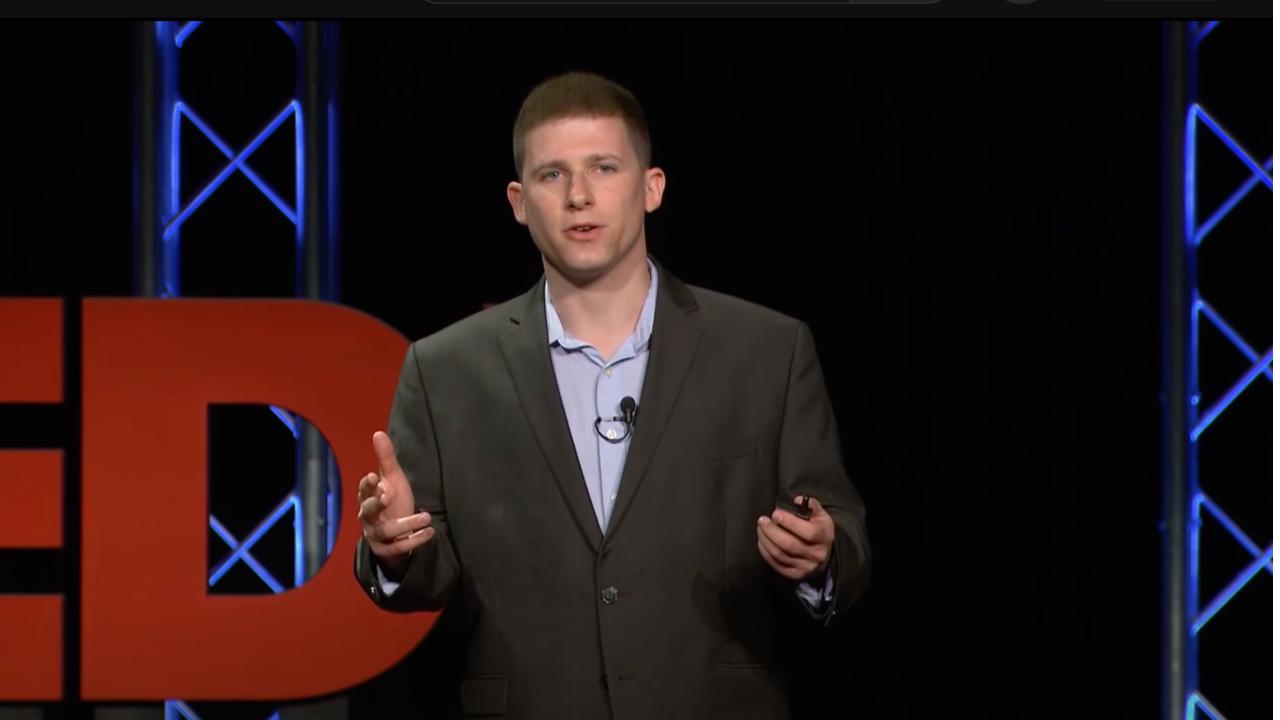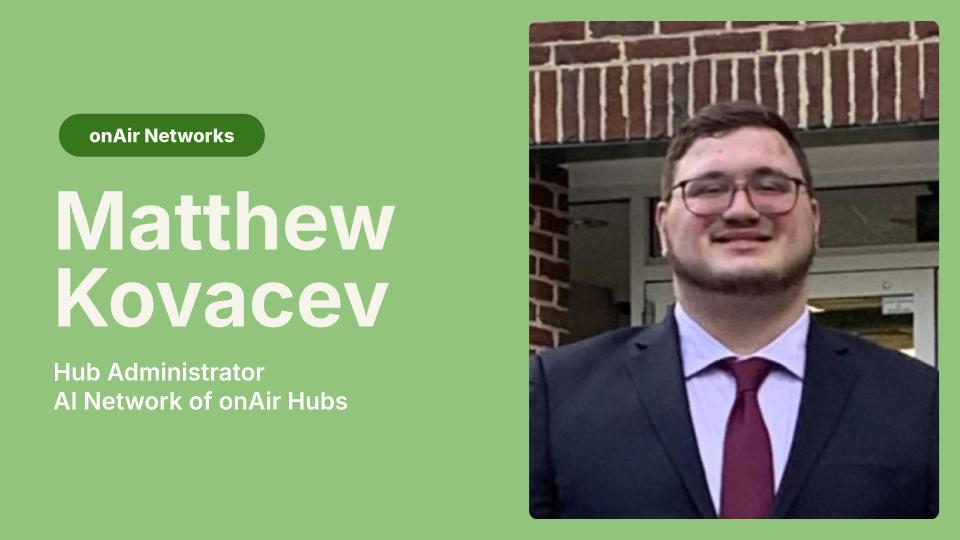Summary
Chief Communications Officer, onAir Networks
Public Policy for Digital Technology, Internet & Telecommunications, Innovation and Technological Emergence
My goal is to help shape policies and strategies around information technologies that empower people throughout the world. My interests include information and communications technologies, Internet & telecommunications policy, technology innovation policy and technology forecasting. I am also interested in spiritual development, electronic art and music, and video games. Technology can bring both great promise and peril, and I thrive in expanding the former and minimizing the latte
TEDx Talks – 16/06/2017 (12:11)
TEDxHerndon
The future is unknowable, but that doesn’t mean we can’t prepare for it. Futures studies provides methods and perspectives to envision different versions of the future. This field can help any person or organization to plan strategically for black swan events and other future developments that transform the world as we know it. This talk introduces the basic concepts of futures studies and the method of scenario planning.
Jeremy is a multidisciplinary technologist, researcher and policy analyst with a background in Computer Science and tech policy. He is currently a Baltimore Corps fellow placed as a data analyst with the Baltimore City Department of Social Services. He loves questions about social interactions with technology, appropriate policy responses for emerging technology issues and how to help organizations through the development and use of technology. He has given talks at venues such as StartingBloc, Hackers on Planet Earth, and the World Future Society conference on a range of futurist and technology-oriented topics. You can find him online at thepezman.flavors.me.
OnAir Post: Jeremy Pesner
News
Bipartisan Policy Center, – November 9, 2022
What are impact assessments?
An impact assessment is a risk management tool that seeks to ensure an organization has sufficiently considered a system’s relative benefits and costs before implementation. In the context of AI, an impact assessment helps to answer a simple question: alongside this system’s intended use, for whom could it fail?
An organization might use an impact assessment to understand how an AI system will impact users and society more broadly at every stage: data-gathering, development, deployment, and continuous monitoring in society. These assessments can serve as critical guard rails for public and private organizations, with the investment required proportionate to risk. For instance, AI systems that offer movie recommendations would receive less scrutiny than those that make hiring or loan decisions. An impact assessment promotes accountability by requiring an organization to document its decision-making process and “show its work.”
During BPC’s work in 2020 on an AI National Strategy for Congress, there was little consensus among experts on the baseline language, scope, and design of a potential assessment. As we learn how to identify and measure harm from AI systems, impact assessments can make the inner workings of the algorithms that power these systems more transparent. The goal is for impact assessments to promote accountability through documentation and knowledge production, rather than to instill fear of liability. This process seeks to create a regulatory incentive for organizations to answer basic questions about decision-making: why was a given regression criterion or training data set chosen and why were alternatives rejected?
About
 Jeremy is a policy analyst, researcher and public speaker with a focus on policy issues of information technology, telecommunications, innovation and futurism. He is passionate about this work because it allows him to apply an equity lens to the single most revolutionary force of the past two decades, which enables everyone to enjoy the benefits and abilities that these new technology bring.
Jeremy is a policy analyst, researcher and public speaker with a focus on policy issues of information technology, telecommunications, innovation and futurism. He is passionate about this work because it allows him to apply an equity lens to the single most revolutionary force of the past two decades, which enables everyone to enjoy the benefits and abilities that these new technology bring.
In various work and volunteer capacities, Jeremy has undertaken complex data analysis, written articles about technology and futurism, organized panels and events, and published award-winning research. He has given and moderated presentations at various conferences including Hackers on Planet Earth, World Future Society, TEDx Fulbright, TEDx Herndon, and SciTalk.
He lived abroad in Israel for a year, during which he worked on the country’s technology policy at Start-Up Nation Central and participated in many lectures and trips to learn more about Israel’s social, political and religious contexts.
Outside of his professional work, Jeremy has learned a lot through his personal growth and self-development work, particularly the value that practices like meditation, yoga, neuro-emotional technique and somatic therapy can bring to addressing trauma, developing emotional intelligence and improving relationships with others. He recognizes that these types of techniques enable us to remember what makes us human, independent of whatever technologies we are using at the moment.
Jeremy earned his BS in Computer Science at Dickinson College, his MA in Communication, Culture & Technology from Georgetown University and his MS in Engineering and Public Policy from Carnegie Mellon University.
He is a member of the Association for Computing Machinery, Institute for Electrical and Electronics Engineers, American Association for the Advancement of Science and the National Science Policy Network. He is also a fellow of StartingBloc, NEXUS Global Summit, the Gabr Fellowship, the Royal Society of Arts and New Leaders Council.
Education
- Dickinson College: Bachelor of Science in Computer Science.
- Georgetown University: Master of Arts in Communication, Culture & Technology.
- Carnegie Mellon University: Completed graduate work and is a PhD student in Engineering and Public Policy.
Experience
Faculty
DMS International · Seasonal
Feb 2025 – Present · Remote
This is a contract role – I am still seeking full time opportunities
Providing training to government and policy professionals on the future of AI and IT, with an emphasis on how this knowledge can be effectively integrated into management activities
Skills
Publications & Presentations
- The Artists Forum
- Association for Computing Machinery
- Bipartisan Policy Center
- FedScoop
- The GovLab
- gnovis Journal
- Hackers on Planet Earth
- Huffington Post
- Journal of Science Policy & Governance (2014, 2021, Workshop)
- Keynote Speakers Agency
- ORCID
- Prezi
- Science Policy Research Unit
- Slideshare
- STGlobal
- TEDx Fulbright
- TEDx Herndon
- Theorizing the Web
- Thirty Second Friendships
Press
- The Afflatus
- American Zionist Movement
- Carbon Radio
- Civic Science Media Laboratory
- ComSciCon
- Electronic Frontier Foundation
- Georgia Institute of Technology
- Georgetown University
- Joe’s Big Idea
- Master’s in Communication
- McGuinness Institute
- Millennium Project
- National Public Radio
- Pew Research Center (1, 2)
- Plz Diversify Your Panel
- Tech Jobs Tour
- Unstuck Project
- Washington Jewish Week
- Your Big Year
- The Zag
- 92YTribeca
Contact
Email: OnAir Member, Consultancy
Videos
How to Predict the Future(s)
(12:11)
By: Talks
TEDxHerndon
The future is unknowable, but that doesn’t mean we can’t prepare for it. Futures studies provides methods and perspectives to envision different versions of the future. This field can help any person or organization to plan strategically for black swan events and other future developments that transform the world as we know it. This talk introduces the basic concepts of futures studies and the method of scenario planning.
Jeremy is a multidisciplinary technologist, researcher and policy analyst with a background in Computer Science and tech policy. He is currently a Baltimore Corps fellow placed as a data analyst with the Baltimore City Department of Social Services. He loves questions about social interactions with technology, appropriate policy responses for emerging technology issues and how to help organizations through the development and use of technology. He has given talks at venues such as StartingBloc, Hackers on Planet Earth, and the World Future Society conference on a range of futurist and technology-oriented topics. You can find him online at thepezman.flavors.me.
reACTor @ TEDxFulbright: mobile news meets mobile gaming
April 19, 2014 (07:29)
By: Fulbright NY
Presentation of reACTor by Josephine Dorado & Jeremy Pesner in TEDxFulbright’s Social Innovation Challenge: http://www.tedxfulbright.org/dc-chall…. reACTor is an initiative to re-envision news & activism by combining them in a mobile game to encourage activism around news stories people care about. http://prezi.com/h8mmaojvshpc/reactor/
Ensuring Social Impact at Every Stage of Technology Research & Development (Video Abstract)
August 30, 2021 (08:27)
By: CivicSciTV Network
This is a video abstract from Jeremy Pesner who authored a policy position paper (Third Place Winner) titled “Ensuring Social Impact at Every Stage of Technology Research & Development” in the Journal of Science Policy and Governance. Volume 18, Issue 03 | August 30, 2021
Paper Abstract
“Although the United States national innovation system has produced many technologies, their benefits are not evenly distributed across the country’s population. This stands in direct contrast to the aims of government, which frequently funds science research for the purpose of social benefit. This paper first undertakes a deep reconsideration of the US national innovation system, and then reframes it as a collective impact initiative in order to coordinate every one of its contributors around this goal.
It begins by tracing the origins of the longstanding tensions between science undertaken for the sakes of science inquiry versus societal benefit. It then discusses the inadequacies of practices meant to bridge science outcomes and societal needs like the broader impacts and technology transfer. It concludes by proposing a significant expansion of the stakeholders that evaluate the proposals and outcomes of federally funded research. This integrates diverse public participation into the proposal selection process, research discussions, and technology transfer to ensure that universal social impact is routinely considered.”
onAir Projects
ITDF & onAir Alliance
Articles
AI & Human Skills
Source: Imaging the Digital Future
If People Cede More and More Work to AI While Forgetting How to Do It Themselves, They Could Change in Several Ways, Losing Thinking, Writing and Organizational Skills
Jeremy Pesner, a policy analyst, researcher and speaker expert on technology, innovation and futurism, wrote, “Children learn to add numbers by hand, but never actually do it once they graduate elementary school. At that point, they are given a calculator because it’s assumed they know how to add well enough to skip the tedium of the process. I suspect that AI systems will be used in the same way – used as shortcuts for thinking once students have already proved that they’re capable of thinking without them. It would be hugely problematic to cede to AI the abilities to think and organize writing and responses before students learn to do that themselves.
“I suspect our education system will remain AI-free until students learn how to do their own research and writing. Given the growing consensus of not giving children mobile phones or social media accounts before high school, I suspect that is the time that they should learn how to use these systems. Hopefully, high schools will teach students how to meaningfully query and use AI, while always double-checking and remaining critical of the output. It may well be possible within the next decade for students to learn to train their own AIs, which can introduce them to the promises and perils of the technology.
I asked ChatGPT about the pros and cons of using a calculator and it highlighted the increased efficiency and its use as aid for advanced learning as professionals and said the cons are decreased engagement with the process and foundations of math. That is an excellent metaphor for the path before us now. How do we maintain our engagement and understanding of the work and material we want to produce while still letting machines handle the parts we don’t want to?
“Depending on how well all of this is handled and executed, humans’ sense of themselves could change in several different ways.
“In what I imagine we would consider to be the better scenario humans learn how to harness AI while still maintaining their innate abilities; just because we all use calculators doesn’t mean we’ve forgotten how to add. In this case, we have clearly delineated the instances in which AI is helpful or routinely outperforms humans, but also where the human touch is still necessary, and how the resultant output changes depending on how many humans and machines are in the mix. Humans, therefore, still understand their unique value contributions to digital work, artistic and entertainment outputs and feel empowered to create what they want while farming out the tedious, busywork that is the more complex version of adding numbers together.
“However, the less-optimistic scenario is that people cede more and more work to AI, while forgetting how to do it themselves. If students just feed essay prompts into ChatGPT and never engage with how to write a response themselves, they will be at a loss for not only the skill of actual writing, but the process of thinking through and structuring their ideas.
“If they just ask ChatGPT for the answers to questions without verifying the response or searching the web themselves, they’ll never understand how to conduct research or use the Internet to bring together information to their fingertips (the technology’s original promise). If they only rely on AI to generate images, music or video and never attempt to create anything original themselves, they won’t develop an engagement with the creative process or understand how to come up with something that has truly never been seen before. What this essentially means is that being human is a muscle we have to stretch and use, just like regular exercise. If we don’t use these traits, we’ll lose them.
“I asked ChatGPT about the pros and cons of using a calculator and it highlighted the increased efficiency and its use as aid for advanced learning as professionals and said the cons are decreased engagement with the process and foundations of math. That is an excellent metaphor for the path before us now. How do we maintain our engagement and understanding of the work and material we want to produce while still letting machines handle the parts we don’t want to? The better an answer we can provide to that question, the greater a chance we stand of maintaining our identity and autonomy as humans.”



